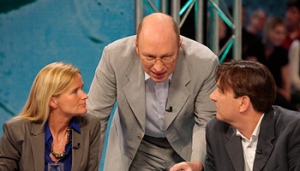 Lorenz Langenegger (Bild: ORF)
Lorenz Langenegger (Bild: ORF)
Langenegger opened the reading competition
‘I’d rather read than listen’, says author Lorenz Langenegger of himself. Just as well that his text ‘Der Mann mit der Uhr’ (The man with the watch) opened the 33rd Festival of German Language Literature.The jury made a ‘rough judgement’ (Clarissa Stadler) of the text of the barely 30-year old author.
‘Der Mann mit der Uhr’ (The man with the watch)
‘Is it comforting that the kindergarten is closer than the graveyard?’ asks unemployed Viktor, who meets the ‘man with the watch’ in a graveyard, in Langenegger’s text.
 IBP_Meike Feßmann, Burkhard Spinnen und Alain Claude Sulzer (Bild: ORF/Puch)
IBP_Meike Feßmann, Burkhard Spinnen und Alain Claude Sulzer (Bild: ORF/Puch)
Feßmann: ‘Alienated’ by the text
Swiss-born author Langenegger was proposed for the competition by his compatriot Alain Claude Sulzer. His new jury colleague Meike Feßmann started off the discussion: she feels ‘somewhat alienated’ by the text: it has, she believes, expressionist traits along the lines of Albert Ehrenstein and he uses the typical ‘Kafka vocabulary’ such as efficiency, commission and insurance company – she likes this even though the author does ‘not yet have a voice of his own’.
Jandl: ‘The oddball is defined in too much detail’
Paul Jandl’s response is: ‘I am not able to get close to this ecology of cities either, unfortunately’. He considers the text to be formally good - but he thinks that the oddball presented in the text is ‘defined in too much detail’. The text works perfectly and is ‘formally beautiful’ - but nevertheless, such a ‘closed cosmos’ is not really to his taste. Although Jandl showed a ‘Jean Paulesque’ affection of the author for the ‘oddball’ and eccentric character, the text was a little too bizarre and cute - he would have liked to see ‘more urban reality’.
 IBP_Lorenz Langenegger (Bild: ORF/Puch)
IBP_Lorenz Langenegger (Bild: ORF/Puch)
‘Beautiful, calm and atmospheric language’
Karin Fleischanderl thought the text was overloaded with symbolism, while praising its ‘beautiful, calm and atmospheric’ language. The text, she believed, was made up of lots of bright lights and snapshots - the problem: the text is divided very brusquely into two parts between Viktor and ‘the man with the watch’.
‘Set in too superficial a manner’ for Mangold
Ijoma Mangold thought she recognised ‘a concrete utopia of longing’. ‘The man with the watch’ pursues the thought: ‘If we meet as individuals, are we able to be close even beyond the various classes‘. A ‘meeting between light and shadow’, represented through the two protagonists. The motif is brought across using ‘very striking and plausible symbolism’; however, they are ‘set in too superficial a manner’ – according to Mangold’s judgement.
 IBP_Publikum (Bild: ORF/Puch)
IBP_Publikum (Bild: ORF/Puch)
Swiss jurors did not agree
Hildegard Elisabeth Keller believed that she recognised ‘lots of 19th and 20th century Swiss regionality and tranquillity’ – Swiss juror Alain Claude immediately and vehemently disagreed: it all reminded him of Bochum. The story, told in ‘very beautiful and slow language’ is ‘well balanced’, he believed. ‘I liked it very much’, said Sulzer.
‘Not enough surprise’ for Spinnen
‘I agree with all of this, but that’s precisely the problem’, said head of the jury, Spinnen, at the end. ‘It is an etude‘ – the problem with it, for Spinnen, is that an etude merely reproduces the steps that another musician has walked before. For Spinnen, as a ‘progressive reader’, despite the very ‘contemporary’ nature of the text, there is too little in the way of surprises.
translated by expectTranslations